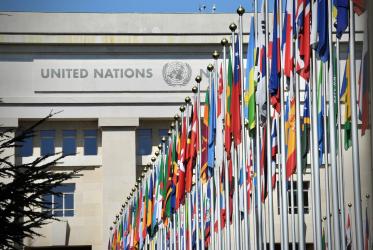The World Council of Churches (WCC) joined other organizations in signing a statement delivered to the United Nations Refugee Agency on 7 October that urges immediate action on statelessness.
The threat of statelessness is growing and new risks of statelessness are outpacing efforts to address statelessness, the statement notes. “In the vast majority of cases, statelessness could have already been eradicated if all governments fully implemented their obligations under international law,” the statement reads. “Once denied the right to a nationality, the stateless face wide-ranging human rights violations, including the right to education, healthcare, employment, property, inheritance, movement, participation, liberty and security of the person.”
Stateless persons also endure high rates of family separation, gender-based violence, human trafficking, and multigenerational poverty, the text continues. “Stateless persons are also subject to forced migration, which is in turn a cause of statelessness – facts recognized in the New York Declaration for Refugees and Migrants,” the message reads. “Communities are increasingly denied documentation or required to prove their links to a state, despite having lived there as citizens for generations.”
In Assam, India, for example, 1.9 million people have been effectively stripped of their nationality as a result of being excluded from the National Registry of Citizens, the message points out.
A strong stand
“In a world where we are sadly experiencing a mushrooming of country leaders who are inciting politics of hatred and fear through populist nationalism, thereby increasingly demeaning human rights and human beings, fuelling racist and xenophobic sentiments, which are all overly affecting the most vulnerable - including stateless people, this joint statement is a reminder to our churches and ecumenical friends of the need to take a clear and strong stand against statelessness. Statelessness is an intersectional issue that includes human rights, gender justice, child rights, migration and refugee law, development, and many more other fields that our ecumenical friends have been traditionally advocating for,” said Segma Asfaw, programme executive for the WCC Commission of the Churches on International Affairs.
Rev. Dr Cornelia Füllkrug-Weitzel, president of Brot für die Welt, said: “The denial of nationality is a major violation of human rights, which affects millions of people worldwide. We are particularly worried about recent developments in Assam (India) that may affect the right to a nationality to nearly 2 million of people and as a consequence may affect all other human rights not just of these 2 million people but their next generation or even generations.”
The statement also notes that there is also a growing incidence of the instrumentalisation of withdrawal of nationality to target political opponents and human rights defenders in violation of international law.
“The Convention on the Rights of the Child protects every child’s right to acquire a nationality and to be registered immediately after birth,” continues the statement. “International law makes provision for the acquisition of citizenship for children born stateless in that state’s territory.”
Many stateless persons are subject to arbitrary, prolonged and even indefinite detention on removal grounds, while no country is willing to accept them, notes the text, urging: “States ultimately have the obligation and responsibility to eliminate this human-made tragedy once and for all.”







